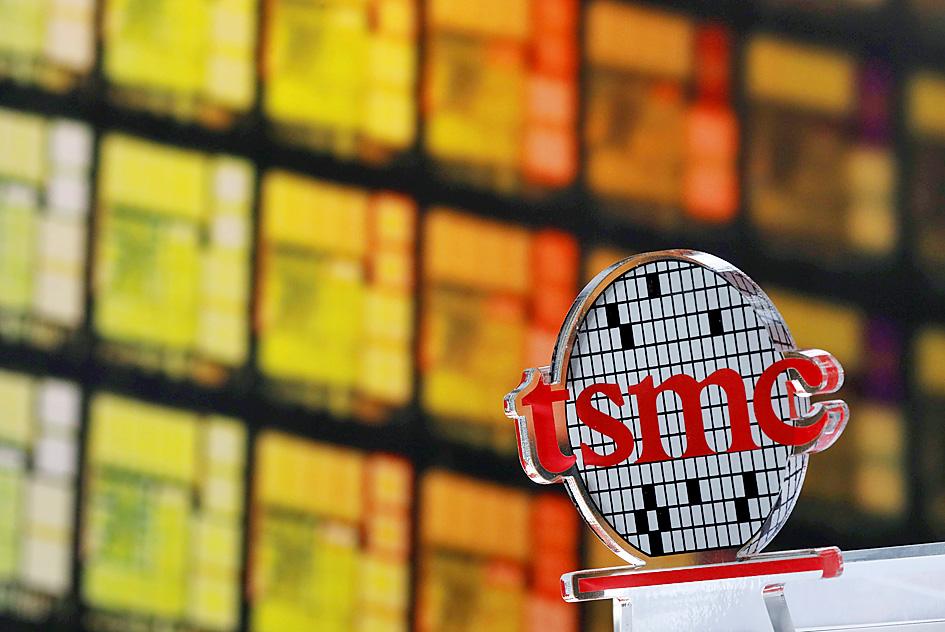US President Donald Trump’s administration is in talks with semiconductor companies about building chip factories in the US, the Wall Street Journal reported yesterday.
The Trump administration has held talks with Intel Corp and Taiwan Semiconductor Manufacturing Co (TSMC, 台積電), the newspaper reported, citing sources and a correspondence viewed by the Journal.
TSMC has been talking with the US departments of commerce and defense and with Apple Inc, one of its largest customers, about building a chip factory in the US, the report added.

Photo: Reuters
Certain US officials are also looking at helping South Korea’s Samsung Electronics Co, which has a chip factory in Austin, Texas, to expand its contract-manufacturing operations in the US, the Journal reported.
It did not give details of any incentives that might be on offer to chipmakers.
TSMC, Apple, Intel and Samsung Electronics were not immediately available for comment.
TSMC remained the world’s third-largest IC supplier in the first quarter of the year, US-based market advisory firm IC Insights said.
In a research report released last week, IC Insights said that TSMC benefited from its efforts to develop the advanced 7-nanometer (nm) process, and its sales for January to March rose 45 percent from a year earlier to US$10.32 billion.
During that same period, Apple and China’s HiSilicon Technologies Co (海思半導體) ordered a large number of TSMC’s 7nm processors for smartphones, IC Insights said.
HiSilicon, which is owned by Huawei Technologies Co (華為), has become a major TSMC client, accounting for 14 percent of TSMC’s total sales last year, it said.
Last year, 37 percent of TSMC’s total revenue came from Apple and HiSilicon, IC Insights said.
In the first quarter, US-based Intel Corp remained the top semiconductor supplier, posting US$19.51 billion in sales, a 23 percent increase from a year earlier, IC Insights said.
Samsung followed with sales of US$14.80 billion, up 15 percent year-on-year, while SK Hynix Inc, also of South Korea, ranked fourth with sales of US$6.04 billion, followed by US-based Micron Technology Inc with US$4.80 billion, IC Insights said.
HiSilicon’s first-quarter sales rose 54 percent year-on-year, which increased its revenue to US$2.67 billion and boosted its rankings to 10th from 15th the previous year, it said.
It was the first time that HiSilicon, which sells more than 90 percent of its products to Huawei, was listed among the world’s top 10 IC suppliers.
In the first quarter, the 10 largest IC suppliers globally posted a combined US$72.49 billion in sales, up 16 percent from a year earlier, IC Insights said.

NEW IDENTITY: Known for its software, India has expanded into hardware, with its semiconductor industry growing from US$38bn in 2023 to US$45bn to US$50bn India on Saturday inaugurated its first semiconductor assembly and test facility, a milestone in the government’s push to reduce dependence on foreign chipmakers and stake a claim in a sector dominated by China. Indian Prime Minister Narendra Modi opened US firm Micron Technology Inc’s semiconductor assembly, test and packaging unit in his home state of Gujarat, hailing the “dawn of a new era” for India’s technology ambitions. “When young Indians look back in the future, they will see this decade as the turning point in our tech future,” Modi told the event, which was broadcast on his YouTube channel. The plant would convert

‘SEISMIC SHIFT’: The researcher forecast there would be about 1.1 billion mobile shipments this year, down from 1.26 billion the prior year and erasing years of gains The global smartphone market is expected to contract 12.9 percent this year due to the unprecedented memorychip shortage, marking “a crisis like no other,” researcher International Data Corp (IDC) said. The new forecast, a dramatic revision down from earlier estimates, gives the latest accounting of the ongoing memory crunch that is affecting every corner of the electronics industry. The demand for advanced memory to power artificial intelligence (AI) tasks has drained global supply until well into next year and jeopardizes the business model of many smartphone makers. IDC forecast about 1.1 billion mobile shipments this year, down from 1.26 billion the prior

People stand in a Pokemon store in Tokyo on Thursday. One of the world highest-grossing franchises is celebrated its 30th anniversary yesterday.

Zimbabwe’s ban on raw lithium exports is forcing Chinese miners to rethink their strategy, speeding up plans to process the metal locally instead of shipping it to China’s vast rechargeable battery industry. The country is Africa’s largest lithium producer and has one of the world’s largest reserves, according to the US Geological Survey (USGS). Zimbabwe already banned the export of lithium ore in 2022 and last year announced it would halt exports of lithium concentrates from January next year. However, on Wednesday it imposed the ban with immediate effect, leaving unclear what the lithium mining sector would do in the